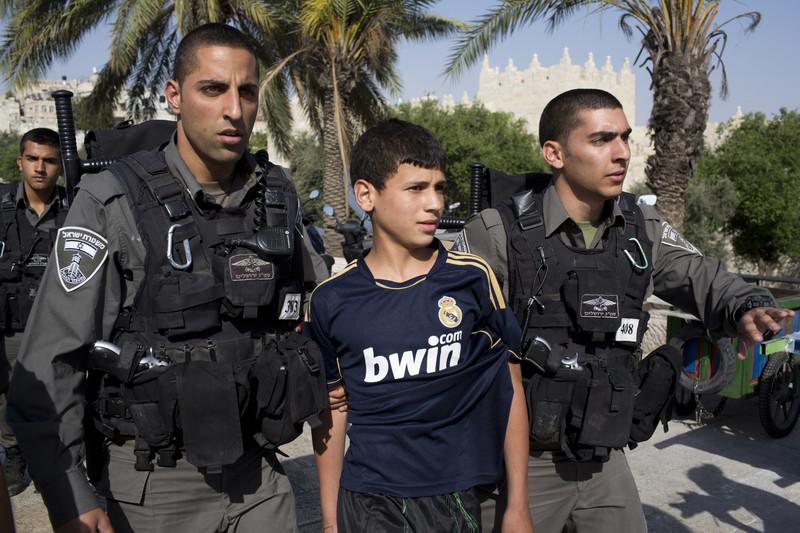
Israel subjects detained Palestinian children from Jerusalem to “extensive denial of their rights,” according to a new report.
The mistreatment of child detainees is part of a wider policy “aimed at encouraging Palestinian residents to leave the city,” the Israeli rights groups B’Tselem and HaMoked state.
These violations include physical abuse, sometimes amounting to torture, and other means of coercing children, usually suspected of throwing stones at occupation forces, to sign confessions which could lead to indictments.
More than 1,700 Palestinian boys aged 12 to 17 from occupied East Jerusalem were arrested from January 2014 through August 2016.
The groups collected testimonies from 60 boys aged 12 to 17 who were arrested and interrogated by Israeli forces in East Jerusalem between May 2015 and October 2016.
Arrested while in bed
More than half of the boys interviewed by B’Tselem and HaMoked were arrested at home between the hours of 11pm and 5:30am, while most were asleep in bed. Others were arrested on the street or were summoned to police stations for questioning.
Sixteen of the boys reported being physically abused while they were being transported to interrogation centers. Once at the interrogation centers, most were subjected to pain and discomfort while they waited.
“The boys were ordered to sit in painful positions (such as crouching) for lengthy periods of time,” the rights groups state. “In some cases, their hands were painfully bound, or they were ordered to face the wall and forbidden to turn their heads.”
Some of the children were denied food or water and access to a toilet, and others reported being physically abused by police while they were waiting.
Most children were not fully informed of their rights, as required by Israeli law.
“The right to remain silent was either glossed over or misrepresented,” the groups state. Half of the boys “were told by the interrogators that exercising the right would hurt them in court; that they would do better not to remain silent as this would prove their guilt.”
Most of the boys were allowed to speak with a lawyer before being interrogated, but were “only allowed a brief conversation of a few minutes.”
Eleven of the 42 boys who were allowed to talk to a lawyer before they were interrogated did so “in the presence of the interrogator, on the interrogator’s phone, in a phone call the interrogator dialed himself.”
Nearly all of the boys interviewed by B’Tselem and HaMoked said that it wasn’t until they were interrogated that they were told why they were arrested.
Only police or Israeli intelligence agents were present at the vast majority of the interrogations, even though Israeli law requires a parent to be present during questioning of a minor.
“However, once a minor has been placed under arrest,” according to the rights groups, the police have “discretion as to whether or not to allow this.”
The groups add police arrest children rather than summon them for questioning because it allows “the police to get around the requirement to have parents present at the interrogation.”
Interrogation and coerced confessions
The interrogation itself usually lasted a few hours; some of the boys were interrogated multiple times. Nine went through five or more interrogation sessions.
Boys were slapped and beaten during interrogation, or threatened, cursed and shouted at by interrogators. Extreme cold and sleep deprivation were also employed against the boys.
Some were told they would only be allowed to use a toilet or get food and water if they confessed to allegations against them.
Fifty of the boys signed confessions. “In 41 of these cases, the confession was written in Hebrew and the boys did not understand what they were signing,” the groups state.
Most of the boys were held at the notorious Russian Compound interrogation center in Jerusalem, where many were strip-searched and nearly all denied contact with their family.
One boy testified that he was held for two weeks in solitary confinement in a small cell with a bright light that remained on at all hours.
“It was easier to be tied up in interrogation than to stay in that cell, cold and alone,” the boy, who was 16 at the time of his arrest, stated.
“Being in solitary confinement was very hard. I signed a lot of confessions. They had me sign one after every interrogation session.”
The rights groups state that police officers, interrogators and prison guards enjoy total immunity as Palestinian child detainees’ rights are extensively violated.
Such conduct is nothing new. A report issued by B’Tselem in 1990 showed similar findings.
“The system strives to keep up the appearance of following legal provisions and regulations,” HaMoked and B’Tselem state, but such safeguards “are routinely rendered hollow and meaningless.”
Maureen Clare Murphy is the managing editor of The Electronic Intifada and lives in Chicago.
Originally published in The Electronic Intifada










































